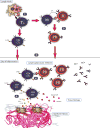Treatment of IgG4-related disease : Current and future approaches
- PMID: 27431746
- PMCID: PMC5953192
- DOI: 10.1007/s00393-016-0142-y
Treatment of IgG4-related disease : Current and future approaches
Abstract
IgG4-related disease (IgG4-RD) is capable of causing great morbidity and even mortality if the condition remains undiagnosed or poorly treated, yet is typically a treatment-responsive disorder. Glucocorticoids have not been studied rigorously and practices with regard to dosing and duration of treatment remain largely empiric. In addition, IgG4-RD patients are often particularly susceptible to and intolerant of the deleterious effects of glucocorticoid therapy. B cell depletion with anti-CD20 monoclonal antibodies appears to be a rapid, effective means of obtaining disease control and limiting patients' glucocorticoid exposure, but this option is frequently not available. Other therapies targeting the B cell lineage may also be efficacious, and one is under study. The means by which depletion or inhibition of B cells and their progeny ameliorate IgG4-RD is coming into focus now through careful mechanistic studies of samples from treated patients. The mechanistic understanding of IgG4-RD will bring an array of specific targets for therapeutic intervention. Plasmablast-directed therapy with a CD19 monoclonal antibody is currently in clinical trials. CD4 + cytotoxic T lymphocytes and fibrosis, both observed nearly universally in the tissue of IgG4-RD patients, present two unexploited vulnerabilities in controlling and even reversing the effects of the disease. Further development of such therapies is a major goal of the next few years.
Keywords: Adverse effects; Antirheumatic agents; B-cells; Glucocorticoids; Monoclonal antibodies.
Figures

Similar articles
-
IgG4-related disease: a complex under-diagnosed clinical entity.Rheumatol Int. 2018 Feb;38(2):169-177. doi: 10.1007/s00296-017-3765-7. Epub 2017 Jul 5. Rheumatol Int. 2018. PMID: 28681251 Review.
-
Rituximab therapy leads to rapid decline of serum IgG4 levels and prompt clinical improvement in IgG4-related systemic disease.Arthritis Rheum. 2010 Jun;62(6):1755-62. doi: 10.1002/art.27435. Arthritis Rheum. 2010. PMID: 20191576
-
IgG4-related disease in Italy: clinical features and outcomes of a large cohort of patients.Scand J Rheumatol. 2016;45(2):135-45. doi: 10.3109/03009742.2015.1055796. Epub 2015 Sep 23. Scand J Rheumatol. 2016. PMID: 26398142
-
Combination therapy of leflunomide and glucocorticoids for the maintenance of remission in patients with IgG4-related disease: a retrospective study and literature review.Intern Med J. 2017 Jun;47(6):680-689. doi: 10.1111/imj.13430. Intern Med J. 2017. PMID: 28321964 Review.
-
Circulating plasmablasts/plasma cells: a potential biomarker for IgG4-related disease.Arthritis Res Ther. 2017 Feb 10;19(1):25. doi: 10.1186/s13075-017-1231-2. Arthritis Res Ther. 2017. PMID: 28183334 Free PMC article.
Cited by
-
The B cell immunobiology that underlies CNS autoantibody-mediated diseases.Nat Rev Neurol. 2020 Sep;16(9):481-492. doi: 10.1038/s41582-020-0381-z. Epub 2020 Jul 28. Nat Rev Neurol. 2020. PMID: 32724223 Free PMC article. Review.
-
IgG4 as a Biomarker in Graves' Orbitopathy.Mediators Inflamm. 2021 Jun 10;2021:5590471. doi: 10.1155/2021/5590471. eCollection 2021. Mediators Inflamm. 2021. PMID: 34220335 Free PMC article. Review.
-
Case Report: Complete atrioventricular block and left ventricular outflow tract obstruction as primary manifestations of immunoglobulin G4-related disease.Front Cardiovasc Med. 2025 Jun 19;12:1544902. doi: 10.3389/fcvm.2025.1544902. eCollection 2025. Front Cardiovasc Med. 2025. PMID: 40612381 Free PMC article.
-
Allergic Aspects of IgG4-Related Disease: Implications for Pathogenesis and Therapy.Front Immunol. 2021 Jul 7;12:693192. doi: 10.3389/fimmu.2021.693192. eCollection 2021. Front Immunol. 2021. PMID: 34305927 Free PMC article. Review.
-
Retrospective single-centre analysis of IgG4-related disease patient population and treatment outcomes between 2007 and 2017.Rheumatol Adv Pract. 2019 May 6;3(1):rkz014. doi: 10.1093/rap/rkz014. eCollection 2019. Rheumatol Adv Pract. 2019. PMID: 31432002 Free PMC article.
References
-
- Carruthers M, Topazian M, Khosroshahi A, et al. Rituximab for IgG4-related disease: a prospective, open-label trial. Ann Rheum Dis. 2015;74:1171–1177. - PubMed
-
- Chari S, Smyrk T, Levy M. Diagnosis of Autoimmune Pancreatitis: The Mayo Clinic Experience. Clin Gastro and Hepatology. 2006;4:1010–1016. - PubMed
-
- Chu SY, Yeter K, Kotha R, Pong E, Miranda Y, Phung S, Chen H, et al. Suppression of rheumatoid arthritis B cells by XmAb5871, an anti-CD19 antibody that coengages B cell antigen receptor complex and Fcγ receptor IIb inhibitory receptor. Arthritis Rheum. 2014;66(5):1153–64. - PubMed
Publication types
MeSH terms
Substances
Grants and funding
LinkOut - more resources
Full Text Sources
Other Literature Sources
Medical
Research Materials
Miscellaneous

